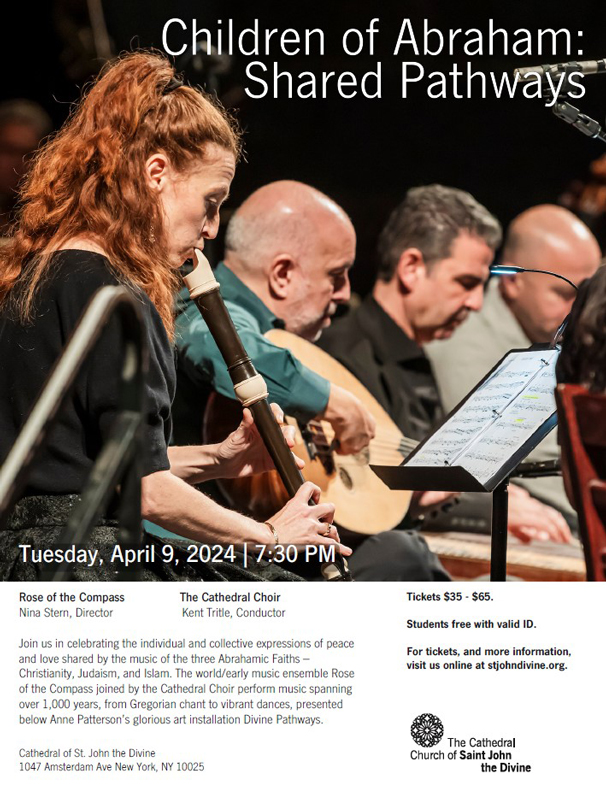On April ninth, 2024, St. John The Divine, the magnificent cathedral in New York City, presented a program titled Children of Abraham. Rose of the Compass joined The Cathedral Coir of St. John the Divine in the nave of the cathedral performing music — traditional and contemporary — in the Christian, Judaic and Islamic traditions.
The name of the Chorus is self-explanatory; its conductor is Kent Tritle. Rose of the Compass is a world/early music ensemble founded by Nina Stern, the ensemble’s director. Its instruments that evening were: recorders and their cousin, the chalumeau; oud; cello; Turkish kanun (a large zither with 26 courses of strings); percussion made up of drums and bells.
19 short pieces — almost exclusively devotional music — were classed into three titled sets: Longing for Peace, The Dance of Life; Celebration of Common Connections. The six or seven pieces within each section were played without interruption, creating a gentle musical flow. Each piece was so distinctive that we were never unsure of which we were hearing.

Early music has a unique spirituality; it connects us with our ancestors. We value its authenticity, its formalistic purity. The oldest pieces in this concert — nestled into their respective sets — were particularly fine. The evening opened with Gregorian chant — Da pacem, Domine — as the chorus entered down the aisle from behind the audience. Petrone is a 14th century English instrumental; it was played on two recorders and tambourine, with the complex, jumpy rhythm we associate with the period.
Twentieth century composers haven’t been particularly interested in religious music. Some critics would say that the dissonance in modern music, the atonal qualities, are at odds with the harmony we associate with religion. But the contemporary pieces in this concert show that the discoveries of modern composers can express spirituality. Hear my Prayer, O Lord, by Kerensa Briggs (English, b. 1991), and Al-Amira wa el Gharaji, by Subaram Raman (Iraqi, b. 1986), express religion through the discoveries of modern music. The latter is a prayer:
Madly, your name I called….
Madly I was calling God….
Oor Es Mawr Im is a medieval Armenian song. The lyric is merely a repetition of the title — meaning Where are you, my mother — and I take the lyric to be devotional. Beneath the woman, the men hummed. A second lyrical obstinato was Ai-yu, by Mohamed Abdelfattah (Egyptian, b. 1962). The reiterated title is an exclamation of awe. Both songs were wonderful.
If the pieces in the concert formed a chain, there was no weak link — every one was marvelous. Enzeli/Triumph, by Ara Dinkjian (Armenian-American, b. 1958), played on the kanun alone or with mandolin, elicited mid-concert applause from the audience.
We wonder if Ben Giderim Batum’a, a Turkish folk song that closed the concert with instruments and chorus, is devotional:
I come to you, my coy darling —
Get ready, grab your clothes —
They are playing kemenche —
Dance “horon” for us! Hey!
Congratulations to Rose of the Cross and The Cathedral Choir of St. John on the brilliant concert! We can’t get enough of their work. We want more as soon as possible.
— Steve Capra, April 2024


